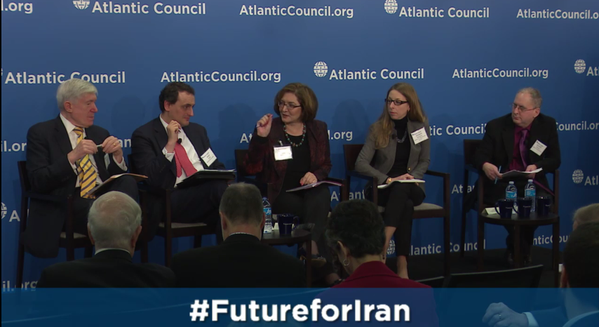 On December 17, as a part of the Atlantic Council and Iran Project’s Conference “What Will Lifting Iran Sanctions Mean for US Firms?”, a panel of experts discussed the United States’ Sanctions Obligations within the JCPOA. The panel consisted of Mr. Kenneth Katzman, Specialist, Middle East Affairs, Congressional Research Service; Ms. Elizabeth Rosenberg, Senior Fellow and Director of the Energy, Economics and Security Program, Center for a New American Security; Ms. Nadereh Chamlou, Former Senior Advisor Middle East and North Africa Region, World Bank; and Mr. Adam Smith, Of Counsel, Gibson, Dunn & Crutcher.
On December 17, as a part of the Atlantic Council and Iran Project’s Conference “What Will Lifting Iran Sanctions Mean for US Firms?”, a panel of experts discussed the United States’ Sanctions Obligations within the JCPOA. The panel consisted of Mr. Kenneth Katzman, Specialist, Middle East Affairs, Congressional Research Service; Ms. Elizabeth Rosenberg, Senior Fellow and Director of the Energy, Economics and Security Program, Center for a New American Security; Ms. Nadereh Chamlou, Former Senior Advisor Middle East and North Africa Region, World Bank; and Mr. Adam Smith, Of Counsel, Gibson, Dunn & Crutcher.
Katzman opened the discussion by addressing the long term future of sanctions beyond implementation day. He commented that any agreement depends on trust, and as the deal itself makes clear, it must be implemented “in good faith…letter and spirit.” Thus far, Iran has failed to release the Washington Post Reporter Jason Rezaian, illustrating that tensions are ever-present. Katzman argued that despite the progress made, there exists potential for turbulence along the way.
https://www.youtube.com/watch?v=<a href="https://www.youtube.com/watch?v=eRAZZc7h48o">https://www.youtube.com/watch?v=eRAZZc7h48o</a>
Following Mr. Katzman’s remarks, Rosenberg noted the disparity between companies from the EU and United States. The broad embargo for American companies will continue to be heavily restrictive, which by comparison, provides companies from the EU, Middle East, and Asia a greater degree of flexibility. The importance of this cannot be understated. The Iranian Revolutionary Guard Corps (IRGC) is deeply intertwined with the Iranian economy, with links between the IRGC and the economy estimated at 20-40%, meaning a significant degree of ambiguity will remain for American companies. Ultimately, Rosenberg argued, “too many forces [will be] pushing for compliance, and in spite of grudging actors and the difficulties that will emerge, it will be too difficult to stop (the deal’s success).”
Next Chamlou offered an optimistic take on Iran reemergence into the global economy. Within five minutes of arriving in Iran, she encouraged, “you see its enormous potential.” She commented that Greece makes up .3% of the world economy, and even with this small number it still had an enormously negative impact when hit with crisis. She argues that Iran could have the opposite effect, and by making up 1.3% of the world’s economy, the potential for global growth and impact are endless. She envisioned three major external shocks to positively impact the Iranian economy: increased trade, influx of oil revenue, and the increased wealth from access to foreign exchange.
Lastly Smith, commented that optimism prevails throughout the Middle East, particularly Dubai, about the opportunities arising from an opening. He cited the surplus of businessmen now traveling between Dubai and Tehran looking to seize on the opening. He believes that while there is this palpable excitement, there is also an anxiety of the potential for mistakes, particularly with the complex web of US sanctions likely to remain. He argues that wide ambiguity on sanctions alongside serious punishments for violating sanctions has led to a wariness from the private sector. Now, the US Department of the Treasury, Smith urged, must offer clarity, guidance, and confidence. Without assurances, the economic potential of the deal will not be realized, which in turn will challenge the JCPOA itself.
